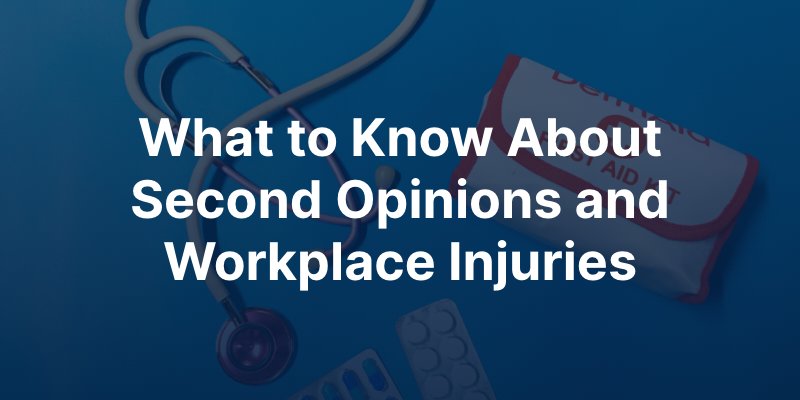Should You Get a Second Opinion After a Workplace Injury?
Request Free ConsultationYou’ve always given your employer your best at work, but now an injury has you off your feet and unable to return to the workplace until you fully recover. Suffering a serious injury that keeps you from earning a living is a distressing experience. We all know that workers’ compensation is meant to be there to protect injured employees, but what if you don’t feel confident in the opinion of the doctor assigned to your case, or you disagree with their decisions about your injury, its treatment, and the impact of the injury on your ability to return to work? Is it okay to seek a second opinion after a workplace injury?

Can I Request the Doctor of My Choice After a Workplace Injury?
There are many reasons injured employees prefer to choose their chosen physicians, but workers’ compensation insurance doesn’t allow room for choice. Instead, this type of insurance compels injury victims to seek treatment through the doctor the employer approved for care—typically chosen from a list of providers given to the employer by the insurance company. If the physician chosen by the employer is a distance away from the injured employee’s residence, workers’ compensation insurance will pay travel expenses for up to 250 miles.
In some instances, it pays to ask the workers’ compensation insurer if they’ll allow you to see the doctor of your choice. Although the Department of Labor in Missouri doesn’t compel the employer or their workers’ compensation insurers to cover the doctor of the employee’s choice rather than that of the employer, in some instances the employer and insurer approve the request.
Although it’s completely within the employee’s rights to request a different physician, the employer and/or insurer often denies these requests. When that’s the case, many injured employees go on to seek second opinions if they’re dissatisfied with the assigned doctor’s determination in their case.
Seeking Second Opinions After a Workplace Injury
When a workers’ compensation insurer offers a settlement based on the medical report of he doctor assigned to your case, there are many reasons to seek a second opinion, including the following:
- You believe the settlement offered isn’t enough for the seriousness of your injuries
- You may feel that the doctor’s recommended course of treatment isn’t appropriate for your injury
- You may have a trusted physician and wish to have their opinion on your injury and course of treatment.
In Missouri Workers’ Compensation policies, the employer has the right to choose the physician assigned to your injury case. In order to receive benefits, injured employees must agree to an examination and treatment through the physician chosen by the employer. Although an injured employee must seek treatment through the specified doctor, they still have the right to make appointments with another doctor for a second opinion. Unfortunately, Workers’ Compensation Insurance won’t pay for an injured employee to get a second opinion, but many injury victims seek second opinions on their own, using their health insurance to pay for the evaluation.
If the physician of choice for a second opinion offers a different diagnosis, treatment recommendation, or prognosis than the doctor assigned to the patient, the employee still has few options other than to present the second opinion to the original doctor. If the second opinion varies widely from the first, it may benefit the injury victim to seek legal representation from a St. Louis workers’ compensation lawyer.
If I Get a Second Opinion, Do I Still Have to Submit to Examinations by the Workers’ Compensation Physician?
Workers’ compensation may terminate an employee’s injury benefits at any time if the employee refuses to submit to periodic examinations by the physician of the employer’s choice. During the employee’s treatment and recovery period, the employer and insurer must monitor the employee’s recovery process to determine when they’re able to return to work.
Contact the Floyd Law Firm today for a free legal consultation.
